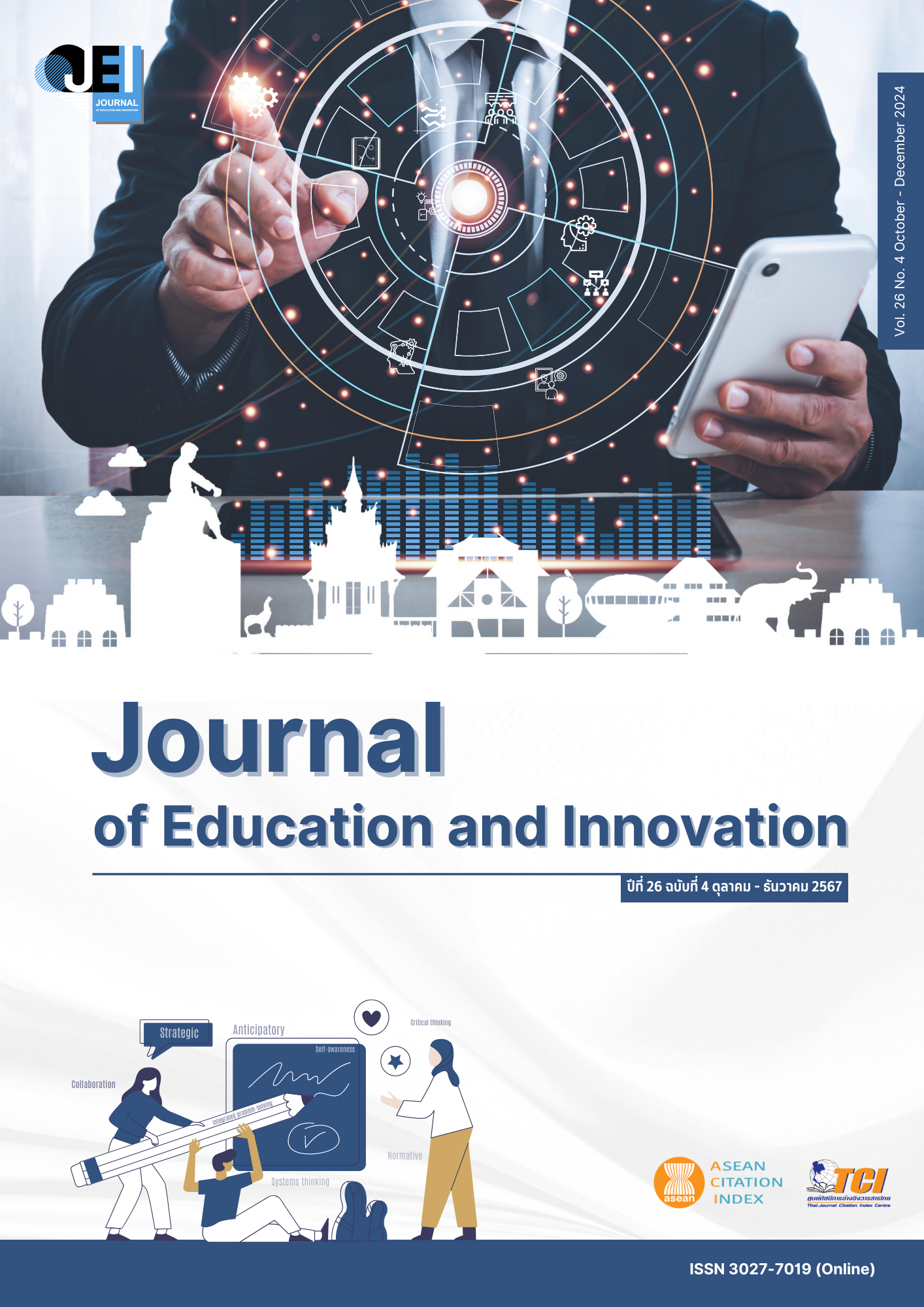THE GUIDELINES FOR SCHOOL-BASED CURRICULUM MANAGEMENT OF WORLD-CLASS STANDARD SCHOOL UNDER THE SECONDARY EDUCATIONAL SERVICE AREA OFFICE NAN
Main Article Content
Abstract
The purposes of this research were to 1) study the school-based curriculum management of world-class standard schools under the Secondary Educational Service Area Office Nan, and 2) propose the guidelines for school-based curriculum management of world-class standard schools under the Secondary Educational Service Area Office Nan. The research could be divided into 2 steps: Step 1: study the school-based curriculum management, in which the sample group included school administrators and teachers in world-class standard school under the Secondary Educational Service Area Office Nan. There were total of 242 individuals, divided into 2 categories: 14 school administrators selected through targeted selection, and 228 teachers selected through random stratified sampling. The data were collected through surveys using a 5-point Likert scale and analyzed using mean values and standard deviation; Step 2: propose the guidelines for school-based curriculum management of world-class standard school. The group of information consisted of qualified individuals with experience in managing the curriculum of world-class standard schools, totally 6 people. The data were collected through interviews and analyzed using content analysis. The research findings indicated as follows 1) The overall results of the school-based curriculum management of world-class standard schools under the Secondary Educational Service Area Office Nan were at a high level. When examining the specific aspects, it was found that the area with the highest average score was planning of implementation of the school-based curriculum, while the area with the lowest average score was evaluation of the school-based curriculum. 2) The propose of the guidelines for school-based curriculum management of world-class standard school under the Secondary Educational Service Area Office Nan revealed that the curriculum management committee should consistently foster understanding of the school-based curriculum among teachers and staff. School administrators should regularly conduct classroom visits to provide guidance and support for teachers. The secondary educational service area office should allocate budgetary support for training programs to enhance the knowledge of teachers and staff, regularly visit and monitor the work performance of school administrators and prioritize curriculum development as a key policy for effective implementation.
Article Details

This work is licensed under a Creative Commons Attribution-NonCommercial-NoDerivatives 4.0 International License.
The owner of the article does not copy or violate any of its copyright. If any copyright infringement occurs or prosecution, in any case, the Editorial Board is not involved in all the rights to the owner of the article to be performed.
References
Anuaun, P. (2016). Factors affecting curriculum management in basic education institutions under the Phuket Primary Educational Service Area Office (Master thesis). Nonthaburi: Sukhothai Thammathirat Open University.
Bureau of Upper Secondary Education Administration. (2022). Guidelines for teaching and learning management in international standard schools (Revised Edition). Bangkok: The Agricultural Cooperative Federation of Thailand.
Chaowachai, S. (2018). Educational Administration Research: Course Materials for 354517 Educational Administration Research. Phitsanulok: Naresuan University.
Hempalathamrong, S. (2016). The approach for school based curriculum administration to the Basic Education Core Curriculum B.E. 2551 of model schools for implementation under the Office of Nakhon Sawan Educational Service Area Office 1-3. Eau Heritage Journal Social Science and Humanities, 6(1), 337-348.
Inlue, C., Tunkaew, S., & Yawirach, P. (2021). The guidelines for curriculum administration promoting career development skills of students at Ban Huay Phueng, Mae Fah Luang District, Chiang Rai Province. Journal of Education Academic Chiang Rai Rajabhat University, 6(1), 45-68.
Inthasingh, S. (2020). School curriculum administration. Chiang Mai: Chiang Mai University.
Kaewla, W., Chanjarain, J., & Siririrth, W. (2015). Administration toward world class standard school under the Secondary Educational Service Area Office 37. Veridian E-Journal, Silpakorn University, 8(1), 1099-1107.
Kaewurai, K. (2021). Curriculum development: From theory to practice. Phitsanulok: Naresuan University Press.
Kao-ian, J. (2014). Techniques for academic administration in educational institutions. Songkhla: Chanmuang Press.
Klomim, K. (2019). STEM Education Curriculum Development (2nd ed.). Phitsanulok: Rattanasuwan Printing 3.
Netkam, P., Wanpira, C., & Sritham, R. (2017). Curriculum management in world class standard school of the Secondary Educational Service Area Office 36. Journal of Social Academic, 10(1), 43-56.
Praphasanobon, O. (2014). School curriculum administration based on the opinions of school administrators and teachers under the Municipalities in Lopburi, Saraburi, and Singburi Provinces (Master thesis). Lopburi: Thepsatri Rajabhat University.
Suebsing, A. (2015). The study of curriculum management of schools under Pathum Thani Primary Educational Service Area Office 1 Journal of Humanities and Social Sciences Valaya Alongkorn, 10(3), 361-369.
Thongcharat, S. (2016). A study of conditions, problems, and solutions in curriculum administration of schools under the Phichit Primary Educational Service Area Office 2 (Master thesis). Phra Nakhon Si Ayutthaya: Phranakhon Si Ayutthaya Rajabhat University.
Wannasri, J. (2014). Academic administration in educational institutions. Phitsanulok: Rattanasuwan Printing 3.
Yomchan, K. (2017). Guidelines for school curriculum management to promote happy learning in schools under the Phitsanulok Primary Educational Service Area Office 1 (Master thesis). Phitsanulok. Naresuan University.


